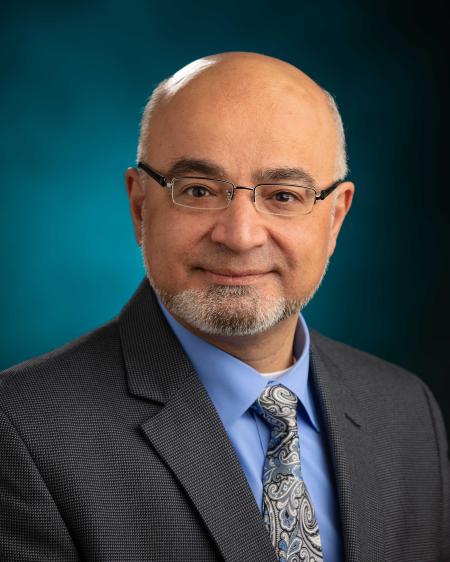Gastroenterology Fellowship
The Gastroenterology and Hepatology Fellowship is a three-year program within the Department of Internal Medicine at the SIU School of Medicine.
Welcome
Thank you for your interest in the Gastroenterology and Hepatology fellowship at SIU School of Medicine. Our three-year, ACGME-accredited program trains graduates to become experts and leaders in their field.
We develop skilled physician-scientists through intense clinical exposure and dedicated research. Our mission is to provide high-quality, cutting-edge health care through systems that improve health outcomes and access for all.
Our fellowship program develops physicians who are experts in all aspects of gastroenterology and hepatology with excellent clinical judgement, extensive medical knowledge and proficiency in procedures. Our fellows learn to deliver humanistic care with compassion, commitment to scholarship, and ethical conduct.
Abdul Swied, MD
Program Director, Gastroenterology and Hepatology Fellowship
Professor of Clinical Internal Medicine
SIU School of Medicine

Program Overview
All incoming fellows will undergo orientation in the first few weeks of the fellowship. The goals of orientation are to prepare the fellows for the activity they will need to carry out and to educate them about the policies and procedures of the fellowship program.
These activities include simulation training at the Memorial Center for Learning and Innovation Simulation labs on all types of endoscopy skills, orientation to the ambulatory clinics, teaching hospitals and electronic medical records.
Didactic teaching by faculty will also be done to educate the fellows on the basics of Gastroenterology and Hepatology diseases physiology, pathophysiology, diagnostic and treatment modalities on a variety of topics.
Orientation also includes the goals of the fellowship, what is expected of them, and education on policies and procedures, error reporting, safety procedures and management of fatigue
First-year fellows will spend their time on the inpatient consultation and endoscopy services at the beginning of the year in order to gain experience in endoscopy early.
While they are on inpatient and consultation service and outpatient clinics, fellows are expected to obtain directed patient medical interviews that are precise, detailed, logical and reliable; conduct thorough physical examinations that elicit subtle findings and are directed towards patients’ problems, and demonstrate understanding and proficiency while minimizing risk and discomfort to patients in the performance of diagnostic and therapeutic procedures. The first year fellows will be expected to develop a meaningful approach to the diagnosis and treatment of their patients’ problems. They are expected to learn how to obtain an informed consent for procedures.
All fellows who perform procedures relevant to the practice of Gastroenterology and Hepatology will be under close supervision of attending physicians. The degree of supervision will be individualized depending on the fellows’ observed abilities. The fellows may perform certain procedures independently after developing adequate skills, as judged by the Program Director.
All fellows are assigned to outpatient clinics where they follow patients throughout their training. As in inpatient services, the fellows see and follow patients under close supervision of attending physicians.
During the first year of fellowship, the primary educational responsibility is clinical gastroenterology and hepatology, but fellows are expected to prepare for their research activity. They should establish collaborative and productive relationship with their mentors, develop plans for their projects, complete the Institutional Review Board (IRB) training modules and submit their proposal to IRB.
Second-year fellows will spend majority of their time in clinical duties with an increased time in endoscopy unit. Fellow are also exposed to GI oncology patients and are expected to present clinical cases in the multi-disciplinary GI tumor board.
It is expected that the fellows will be delivering appropriate, effective, and compassionate care with professionalism during the second year. They will evaluate their own clinical practices and define ways to improve upon their clinical practice.
Fellows are expected to follow their patients in their continuity clinics under close supervision by faculty. Fellows will work with health-care professionals from other departments as a team member of a multidisciplinary group.
During the second year of fellowship, more time is available for research. The fellows should have their projected submitted and approved by the IRB and actively engaged in clinical research. Data collection should be underway. Fellows are also expected to perform other scholarly activities like teaching and abstract presentation at national meetings. Fellows will also be educated on cost-effective delivery of healthcare.
Our third-year fellows will have completed their clinical rotations in order to qualify for ABIM gastroenterology and hepatology certification examinations. Fellows will also rotate in various electives including pediatric gastroenterology and pathology.
During the third year, fellows are expected to present at the Department of Internal Medicine’s research conference. They are also expected to present their findings at a national meeting and/or author a paper.
Fellows are required to complete a 4-week away rotation for transplant hepatology in St. Louis at St. Louis University.
Before graduation, fellows will have to meet all the requirements defined in detail under “Program Mission, Goals and ACGME General Competencies.”
Application information
We are an ACGME-accredited program for a maximum of six fellows and accept two fellows each academic year.
- Our program accepts applications ONLY through ERAS.
- We do not accept J-1 or H-1 visas.
- Our interview dates are September 12 and 26.
- Interview times are first come, first served, and interviews will be held in person.
- We participate in the national fellowship match. The rank order list deadline is November 20, 2025. Match Day is December 4, 2025.
- Signaling is considered and appreciated, but we review all applications and our selection is based on multiple criteria.
If you have questions, please contact GIfellowship@siumed.edu.
